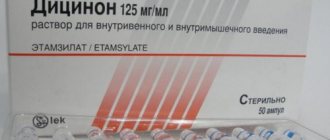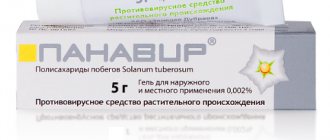Pharmacodynamics and pharmacokinetics
Hexoprenaline is a selective beta-2-sympathomimetic, consisting of two catecholamine groups. The active substance has the ability to block specific receptors of the uterus and relax its muscles. The frequency and intensity of contractions is significantly reduced. The medicine blocks labor contractions (spontaneous or caused by the hormone oxytocin ).
During childbirth, Ginipral can normalize the strength and regularity of uterine contractions and suppress premature contractions. The medicine, for those who took it during pregnancy, allowed them to carry the fetus to normal term. The drug has the ability to slightly influence the cardiovascular system of a pregnant woman and fetus.
Immediately after intravenous administration of the drug, contractions begin to be suppressed, and the effect of the drug continues for about 20 minutes.
After entering the body, the active substance undergoes methylation using catecholamine-o-methyltransferase . It is noteworthy that the catecholamine groups must undergo the methylation , otherwise hexoprenaline will become biologically inactive. Therefore, the product affects the body for quite a long time.
In the first 4 hours after taking the drug, about 80% of the active components of the drug are excreted in the urine. A small amount of the drug is excreted in the bile as metabolites .
Pharmacological properties of the drug Ginipral
Selective beta2-adrenomimetic, reduces the tone and contractile activity of the myometrium. Reduces the frequency and intensity of uterine contractions, suppresses spontaneous and oxytocin-induced labor contractions. During childbirth, it normalizes excessively strong or irregular contractions. Under the influence of the drug, premature contractions stop in most cases, which makes it possible to prolong pregnancy until the normal term of birth. Due to its beta2 selectivity, the drug has a slight effect on the cardiac activity and blood flow of the pregnant woman and the fetus.
Indications for use
Tablets are prescribed for the existing threat of premature birth, including as part of complex treatment.
The use of injections and droppers is indicated:
- before turning the fetus (if turning is necessary);
- with obvious or hidden prolapse of the umbilical cord or its entanglement;
- to immobilize the uterus before caesarean section ;
- as an emergency measure if premature birth occurs, before taking the woman to the hospital. institution;
- when inhibiting contractions during childbirth (with acute intrauterine asphyxia );
- to inhibit premature contractions if the os of the uterus is dilated or the cervix is effaced;
- for the prevention of premature contractions;
- when performing cervical cerclage to immobilize the uterus.
Contraindications
The drug is not prescribed:
- with coronary heart disease and high blood pressure;
- women suffering from severe kidney and liver diseases;
- for bronchial asthma ;
- for angle-closure glaucoma ;
- in the first trimester of pregnancy;
- in case of cardiac arrhythmia, tachycardia , myocarditis ;
- persons with mitral valve disease or aortic stenosis ;
- with thyrotoxicosis ;
- if allergic to the components of the product (especially sulfites );
- during lactation ;
- for intrauterine infections and bleeding, premature placental abruption .
Ginipral, 5 pcs., 2 ml, 10 mcg/2 ml, solution for intravenous administration
During the use of Ginipral®, you should monitor the mother's pulse and blood pressure, as well as the fetal heartbeat.
It is recommended to record an ECG before and during treatment.
Patients with hypersensitivity to sympathomimetics should use Ginipral® in small doses prescribed individually, under constant medical supervision.
If there is a significant increase in maternal heart rate (more than 130 beats/min) and/or a marked decrease in blood pressure, the dose should be reduced; if there are complaints of difficulty breathing, pain in the heart and if signs of heart failure appear, the use of Ginipral® should be stopped immediately.
Pregnant women with diabetes should monitor carbohydrate metabolism, because the use of Ginipral® (especially in the initial stage of treatment) may cause an increase in blood sugar levels. If childbirth occurs immediately after a course of treatment with the drug, it is necessary to take into account the possibility of hypoglycemia and acidosis in newborns due to transplacental penetration of acidic metabolic products (lactic and ketonic acids).
In some cases, simultaneous use of GCS during Ginipral® infusion may cause pulmonary edema. Therefore, during infusion therapy, constant careful clinical monitoring of patients is necessary. This is especially important in the combined treatment of GCS in patients with concomitant diseases that contribute to fluid retention (kidney disease).
Strict limitation of excess fluid intake is necessary.
The risk of possible development of pulmonary edema requires limiting the volume of infusion as much as possible, as well as using solutions that do not contain electrolytes to dilute the drug.
You should limit your salt intake from food.
Before starting tocolytic therapy, it is necessary to take potassium supplements, because with hypokalemia, the effect of sympathomimetics on the myocardium is enhanced.
The simultaneous use of certain narcotic drugs (halothane) and sympathomimetics can lead to cardiac arrhythmias. Taking Ginipral® must be stopped before using halothane for anesthesia.
With prolonged tocolytic therapy, it is necessary to monitor the condition of the fetoplacental complex and ensure that there is no placental abruption. Clinical symptoms of premature placental abruption can be smoothed out with tocolytic therapy. When the membranes rupture and when the cervix is dilated by more than 2–3 cm, the effectiveness of tocolytic therapy is low.
During tocolytic treatment, it is necessary to monitor bowel movements.
During tocolytic treatment with beta-agonists, the symptoms of concomitant dystrophic myotonia may intensify. In such cases, the use of diphenylhydantoin preparations is recommended.
Coffee and tea may increase the side effects of Ginipral®.
Side effects
As a rule, there are no problems when taking this drug.
During use, anxiety, headache , tachycardia , nausea, dizziness , and tremor .
Also possible:
- diarrhea , asthmatic attack , loss of consciousness, anaphylactic shock , difficulty breathing;
- increased heart rate and blood , pulmonary edema , fluctuations in fetal heart rate, tachycardia , redness of the skin;
- ventricular extrasystole , pain in the heart area;
- increased blood sugar levels;
- decreased intensity of diuresis , edema , decreased potassium levels, increased levels of transaminases in the blood;
- inhibition motility , constipation , intestinal atony (rare).
bronchospasm , acidosis and anaphylactic shock sometimes occurred after application of the drug to their mother .
Overdose of the drug Ginipral, symptoms and treatment
An overdose of GINIPRAL can be determined by a strong increase in the mother's heart rate, the occurrence of tremor, palpitations, headache, and sweating. These manifestations can usually be removed by reducing the dose of the drug. To eliminate severe manifestations of drug overdose, it is necessary to use GINIPRAL antagonists - non-selective beta-adrenolytic drugs that completely neutralize the effect of GINIPRAL.
List of pharmacies where you can buy Ginipral:
- Moscow
- Saint Petersburg
Instructions for Ginipral (Method and dosage)
Depending on the task and the condition of the pregnant woman, various dosage forms are used in different dosages.
Instructions for use of Ginipral tablets
Swallow the tablet whole with water.
As a rule, the medicine is prescribed one tablet every 3 hours, then the interval between doses is reduced to 4-6 hours. The average daily dosage is from 2 to 4 mg of the drug (up to 8 tablets).
If there is a threat of premature birth, then the medicine is taken in a dosage of 500 mcg 60-120 minutes before the end of the hexoprenaline .
Ginipral infusions during pregnancy
The dosage is selected individually, after consultation with a doctor.
The contents of one capsule are usually diluted in an isotonic solution of sodium chloride . Introduce slowly, gradually, over 5-10 minutes.
Recommended:
- in case of acute toxolysis, an intravenous injection of 10 mcg of the drug is given, then proceed to infusion;
- during massive toxolysis , one ampoule (2 ml) is used, the average rate of administration is 0.3 micrograms per minute;
- for prolonged toxolysis, the dosage is selected by the doctor, the rate of administration is 0.075 mcg per minute.
If contractions have not resumed after 2 days, then switch to the tablet form.
Ginipral 0.5 mg tab No. 20
Dosage
0.5 mg
Active substance
Hexoprenaline
Manufacturer
Globopharm Pharmaceuticals Products und Handelsgesellschaft mbh (Austria)
Shelf life
5 years
Storage conditions
In a place protected from light, at a temperature not exceeding 25 °C
Registration certificate number
P N015664/01 dated 05/24/2010
Description of the dosage form
Pills:
white, round, biconvex.
Pharmacokinetics
When taken orally, it is well absorbed. It is excreted in the form of a dimethylated derivative in the urine and in the bile - in the form of complex metabolites.
Ginipral® consists of 2 catecholamine groups, which in the human body undergo methylation via catecholamine-O-methyltransferase. Hexoprenaline becomes biologically inactive only if both of its catecholamine groups are methylated. When administered intrabronchially, 3H-labeled hexoprenaline is excreted in the urine in the form of a biologically active substance for a relatively long time. Part of the injected substance remains active at the injection site for quite a long time.
Pharmacodynamics
Relaxes the muscles of the uterus, reduces the frequency and intensity of contractions, suppresses spontaneous and oxytocin-induced labor contractions. During childbirth, it normalizes the strength and regularity of contractions, suppresses (in most cases) premature contractions and helps prolong pregnancy until the normal due date. Has little effect on the cardiovascular system of the pregnant woman and fetus.
Contraindications
hypersensitivity (especially in patients suffering from bronchial asthma and hypersensitivity to sulfites);
thyrotoxicosis;
cardiovascular diseases, especially cardiac arrhythmias occurring with tachycardia; myocarditis, mitral valve disease and aortic stenosis;
IHD;
arterial hypertension;
severe liver and kidney diseases;
angle-closure glaucoma;
premature placental abruption, uterine bleeding, intrauterine infections;
pregnancy (first trimester);
lactation period.
Use during pregnancy and breastfeeding
Contraindicated in the first trimester of pregnancy. Breastfeeding should be stopped during treatment.
Directions for use and doses
Inside
with a small amount of water.
In the absence of other recommendations, the indicated dosage should be strictly followed.
Threat of premature birth:
1–2 hours before the end of the Ginipral® infusion, start taking tablets at a dose of 0.5 mg (1 tablet) every 3 hours, then every 4–6 hours (4–8 tablets per day).
Side effects
Dizziness, anxiety, slight tremor of the fingers, increased sweating, tachycardia, headache, increased activity of liver enzymes.
A decrease in blood pressure, especially diastolic, is possible. In some cases, nausea and vomiting develop.
In rare cases - ventricular extrasystole, pain in the heart (cardialgia). These symptoms disappear quickly after stopping the drug.
Blood sugar levels increase due to the glycogenolytic effect of the drug (especially in diabetes).
Diuresis decreases at the beginning of treatment. In patients with a tendency to retain fluid in the tissues, this can lead to edema.
During treatment with Ginipral®, the intensity of intestinal motility may decrease (pay attention to the regularity of stool).
In newborns - hypoglycemia, acidosis, bronchospasm, anaphylactic shock.
Interaction
A number of drugs that lower blood pressure (β-blockers) weaken the effect of Ginipral® or neutralize it.
Methylxanthines (for example theophylline) enhance the effect of Ginipral®.
The effect of oral hypoglycemic agents during therapy with Ginipral® is weakened.
General anesthesia (halothane) and adrenergic stimulants (cardiovascular and anti-asthmatic drugs) increase side effects from the cardiovascular system.
Ginipral® is incompatible with ergot alkaloid, MAO inhibitors, tricyclic antidepressants, as well as mineralocorticoids, dihydrotachysterol and preparations containing calcium and vitamin D.
Overdose
Symptoms:
anxiety, tremor, increased sweating, severe tachycardia, arrhythmia, headaches, cardialgia, decreased blood pressure, shortness of breath.
Treatment:
the use of Ginipral® antagonists - non-selective β-blockers that completely neutralize its effect.
special instructions
Blood pressure, pulse and cardiac activity should be under constant medical supervision.
In patients with diabetes, blood sugar levels should be monitored.
Under the influence of Ginipral®, diuresis decreases, so you should carefully monitor symptoms reflecting fluid retention in the body (for example, swelling of the legs, difficulty breathing). This is especially important in the case of simultaneous use of corticosteroids or in cases of kidney disease.
Strict limitation of excess fluid intake is necessary.
You should limit your salt intake from food.
During tocolytic treatment, it is necessary to monitor bowel movements.
With prolonged tocolytic therapy, it is necessary to monitor the state of the fetoplacental complex. When the membranes rupture and when the cervix is dilated by more than 2–3 cm, the effectiveness of tocolytic therapy is low.
If surgical intervention is necessary, the anesthesiologist should be informed about Ginipral® therapy.
It is necessary to take into account the use of any other drugs when prescribing therapy with Ginipral®.
Coffee and tea may increase the side effects of Ginipral®.
You should immediately inform your doctor about contraindications or the development of side effects.
Conditions for dispensing from pharmacies
On prescription.
Pharmgroups
Selective beta2-adrenergic agonist (Tocolytics)
Pharmaceutical actions
tocolytic
Interaction
You cannot mix Ginipral and other solutions except isotonic solution and glucose .
Beta blockers neutralize or significantly weaken the effect of the drug.
The medicine weakens the effect of hypoglycemic drugs.
Methylxanthines , in particular Theophylline, can enhance the effectiveness of the product.
It is not recommended to combine the drug with sympathomimetics , beta-agonists and ftorotan due to the increased load on the cardiovascular system .
The combination of glucocorticosteroids and Ginipral can reduce the intensity of glycogen .
The product is incompatible with dihydrotachysterol , calcium, vitamin D , ergot alkaloids , halothane , tricyclic antidepressants , mineralocorticoids and MAO inhibitors .
special instructions
When taking the drug, diuresis decreases, edema may occur, including pulmonary edema . It is recommended to limit the consumption of liquids and salty foods, and to use solutions without electrolytes to dilute the medicine.
During the administration of the drug, it is recommended to monitor the functioning of the cardiovascular system of the mother and fetus, and perform an ECG before and during administration of the drug.
If the mother's pulse reaches 130 beats per minute, and blood pressure has dropped significantly, it is necessary to reduce the dosage. If a pregnant woman develops chest pain and signs of heart failure, the drug is discontinued.
If the patient has previously experienced hypersensitivity to sympathomimetics , then the dosage should be selected individually; the minimum active and effective dose is recommended.
diabetes should be especially careful when taking the drug , as the drug may increase blood glucose levels. It is necessary to take into account the likelihood of developing acidosis and hypoglycemia in newborns.
It is also recommended to take prophylactic medications that support the heart muscle before taking a course of medication, such as potassium supplements .
If the membranes have ruptured and the cervix is dilated by more than 3 cm, tocolytic therapy is inappropriate.
It is highly not recommended to take the medicine with coffee or tea, due to increased side effects from the cardiovascular system.
Use of the drug Ginipral
For IV injections or infusions. The contents of the ampoule must be administered intravenously slowly (over 5-10 minutes) using automatically dosing infusion pumps or using conventional infusion systems - after diluting with isotonic sodium chloride solution to 10 ml. Dosage:
- Acute tocolysis. 10 mcg (1 ampoule of 2 ml). In the future, if necessary, treatment can be continued with infusions (see instructions for use of GINIPRAL (25 mcg concentrate for preparation of infusion solution).
- Massive tocolysis. At the beginning, treatment begins with the administration of 10 mcg (1 ampoule of 2 ml), followed by infusion of GINIPRAL at a rate of 0.3 mcg/min. As an alternative treatment, it is possible to use only GINIPRAL infusion at a rate of 0.3 mcg/min, without prior bolus administration of the drug.
- Long-term tocolysis. Long-term drip infusion of 0.075 mcg/min (see instructions for use of GINIPRAL 25 mcg concentrate for the preparation of infusion solution). If contractions do not resume within 48 hours, treatment can be continued with GINIPRAL 0.5 mg tablets (see appropriate instructions for use).
The indicated dosage can only be used as a guide; during tocolysis it must be adjusted individually. During the use of GINIPRAL, the mother's pulse and blood pressure, as well as the fetal heartbeat, should be monitored. It is recommended to record an ECG before and during treatment. Patients with hypersensitivity to sympathomimetics should use GINIPRAL in small doses prescribed individually, under constant medical supervision. If there is a significant increase in the mother's heart rate (more than 130 beats/min) and/or a significant decrease in blood pressure, the dose should be reduced; If there are complaints of difficulty breathing, pain in the heart, or if signs of heart failure appear, the use of GINIPRAL should be stopped immediately. Pregnant women with diabetes should monitor carbohydrate metabolism, because the use of GINIPRAL, especially in the initial stage of treatment, may cause an increase in blood sugar levels. If childbirth occurs immediately after a course of treatment with GINIPRAL, it is necessary to take into account the possibility of hypoglycemia and acidosis in newborns due to transplacental penetration of acidic metabolic products (lactic and ketonic acids). In some cases, the simultaneous use of corticosteroids during GINIPRAL infusions may cause pulmonary edema. Therefore, during infusion therapy, constant careful clinical monitoring of patients is necessary. This is especially important during combined treatment with corticosteroids in patients with concomitant diseases that contribute to fluid retention (kidney disease). The risk of possible development of pulmonary edema requires limiting the volume of infusion as much as possible, as well as using dilution solutions that do not contain electrolytes. You should limit your salt intake from food. Before starting tocolytic therapy, it is necessary to take potassium supplements, because with hypokalemia, the effect of sympathomimetics on the myocardium is enhanced. The simultaneous use of certain narcotic drugs (halothane) and sympathomimetics can lead to cardiac arrhythmias. Taking GINIPRAL must be stopped before using halothane for anesthesia. With prolonged tocolytic therapy, it is necessary to ensure that there is no placental abruption. Clinical symptoms of premature placental abruption can be smoothed out with tocolytic therapy. When the membranes rupture and when the cervix is dilated by more than 2-3 cm, the effectiveness of tocolytic therapy is low. During tocolytic treatment with beta-agonists, the symptoms of concomitant dystrophic myotonia may intensify. In such cases, the use of diphenylhydantoin (phenytoin) drugs is recommended. armacodynamic and pharmacokinetic: Non-selective beta blockers weaken the effect of GINIPRAL or neutralize it. Methylxanthines, e.g. theophylline, enhance the effect of GINIPRAL. The intensity of glycogen accumulation in the liver caused by the use of glucocorticoids is reduced by the action of GINIPRAL. GINIPRAL weakens the insulin effect of antidiabetic drugs. The simultaneous use of GINIPRAL with other sympathomimetics (drugs for normalizing blood circulation, anti-asthmatic drugs) should be avoided, because this may cause increased effects on cardiac function and symptoms of overdose. GINIPRAL is not recommended for use together with ergot alkaloids, as well as with preparations containing calcium and vitamin D, dihydrotachysterol or mineralocorticoids. Compatibility. Sulfite is a highly active component, so you should refrain from mixing GINIPRAL with solutions other than isotonic sodium chloride solution and 5% glucose solution.
Ginipral during pregnancy
Taking the product in the first 12 weeks is prohibited.
The use of IVs during pregnancy is indicated in the 2nd and 3rd trimesters. Injections must be performed under the supervision of a physician.
Pills are often prescribed during late pregnancy to reduce the likelihood of premature birth due to uterine hypertonicity .
Taking the medication during lactation is highly not recommended.
Judging by the reviews, sometimes side effects from the drug occur, so you can only drink it after consulting a doctor.
Instructions on how to take Ginipral tablets during pregnancy are described above.
It should be added that doctors often prescribe Verapamil and Ginipral during pregnancy (in combination). Thus, it is possible to avoid side effects from both drugs.
Ginipral price, where to buy
The cost of the drug in ampoules during pregnancy is about 270 rubles for 5 pieces.
How much does it cost to buy Ginipral tablets in Moscow?
You can purchase the tablet form of the medicine for 200-250 rubles per package, usually in a private pharmacy. Availability in pharmacies should be checked in advance, as the product sells out quickly.
- Online pharmacies in RussiaRussia
- Online pharmacies in UkraineUkraine
ZdravCity
- Ginipral solution for intravenous injection.
5 mcg/ml 2 ml 5 pcs. Nycomed Austria GmbH/Takeda Austria GmbH. RUB 241 order
Pharmacy Dialogue
- Ginipral (amp. 10 µg 2 ml No. 5)Nycomed
RUB 232 order
show more
Pharmacy24
- Ginipral 25 mcg/5 ml No. 5 concentrate Takeda Austria GmbH, Austria
173 UAH.order - Ginipral 10 mcg/2 ml No. 5 solution for injection
143 UAH order



